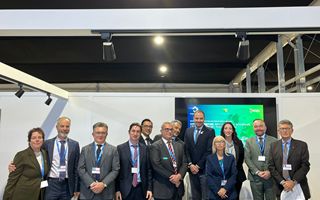(Finance) – The COP29 represents a crucial moment to rethink the relationship with cities and territories, in a context of growing urbanization and climate change. The cities, which they are home to over 50% of the world’s population and generate 70% of greenhouse gas emissions, they are at the heart of climate challenges but also offer the greatest opportunities for innovation.
To transform cities into engines of sustainability, resilience and innovationit is necessary to focus on urban regeneration and sustainable mobility. Interventions such as the creation of green spaces, the use of green infrastructures and the energy efficiency of buildings can reduce environmental impact, improving the quality of urban life. Furthermore, more sustainable mobility, based on public transport, electrification and soft mobility, will reduce emissions and congestion.
At the same time, rural and peri-urban territories must be rethought for promote carbon absorption, sustainable management of natural resources and protection of biodiversity. Integrated and long-term policies are essential to ensure harmonious and sustainable development between cities and territories.
The global vision for the cities of the future is not limited to greener spaces or efficient buildings, but embraces inclusiveness and improving the quality of life for all citizens. COP29 will therefore have to promote strategies and tools that transform cities into places of sustainability and innovation, with an integrated approach that takes into account the interconnections between urban and rural environments.
“COP29 offers the opportunity to put the issue of urban and territorial regeneration at the center of the negotiationscreating alliances between governments, cities, businesses and civil society for the implementation of concrete policies. The involvement of citizens and local communities is crucial: climate solutions must be participatory, inclusive and adaptable to specific contexts. Global resources could be directed to innovative projects that integrate environmental sustainability, economic development and social justice. It represents a fundamental moment for rethink our cities and territories, adopting policies that promote recovery and regeneration with a view to sustainability, resilience and equity. Cities, in particular, must become the global laboratory for climate solutions, with the aim of creating urban spaces that are simultaneously green, liveable and low-emission. Only through an integrated and long-term vision, which involves all social and institutional actors, will it be possible to build territories that can face the challenges of climate change and guarantee a sustainable future for all” he declares Silvia Paparella.
“At COP29, Sogesid presented the Italian model of environmental regeneration as a reference for international contexts,” said the President Mantovanelli. “In Central Asia, we collaborate with the Ministry of Foreign Affairs and AICS in the Aral Sea redevelopment project, with the aim of promoting inclusive resource governance.”
“ANSFISA underlines the importance of encouraging the modal shift towards safer transport systems such as rail or public transport in general, which are also less polluting. Furthermore, we need to create increasingly resistant and more resilient infrastructures. Considering the large number of transport infrastructures already existing in Italy, including many bridges, viaducts and tunnels, it is important to use monitoring systems that give the possibility of making the right decisions before the event occurs, through real-time alerts, and even after the extreme event has occurred, for a rapid restoration of the functionality of the work. ANSFISA favors all this by intervening with road and railway managers, promoting safety and supervising them, but also collaborating as recently done with the signing of the Support Agreement for the design of the monitoring system of the bridge over the Strait of Messina” , says the Director Domenico Capomolla.
For the President GBC Italia, Fabrizio Capaccioli, “Cities, responsible for 70% of global CO2 emissions, are at the center of the global climate and social challenge. The economic burden remains enormous, if we think that the ecological transition requires up to 5 trillion dollars a year. Our task today is very clear: sustainability must be a right accessible to all and not a luxury reserved for a few. Cities must be thought of as spaces for aggregation, where every building and every urban space contributes to creating lively, cohesive and inclusive communities, capable of responding to everyone’s needs. Here, from COP29, we reiterate the mission of the Green Building Council Italia: to guide this process, promoting urban planning that respects the identity of our country and that puts human well-being and the value of Made in Italy at the centre. Let us build, together, cities in which living is an experience of connection and participation, where each person can find their own space and feel part of a community.”
“We are in Baku after last year’s experience in Dubai, to demonstrate our commitment to the fight against climate change on the occasion of Cop29, together with the institutions and the Ministry of the Environment to participate in the programmatic conference on the theme: ‘Cities and Territories’. The event focused on the synergies between institutions, scientific research, designers and stakeholders to address the climate and environmental challenges in the cities and infrastructures of the future, I exposed the new design standards necessary to respond to extreme meteorological phenomena, such as those recently occurred in our country and beyond. I shared with the community present that, while adopting the best design solutions, it is no longer possible to design without carefully considering the context in which we all live. Today, more than ever, designers must take into account the characteristics and vulnerabilities of the territory, in particular sensitive and very often fragile areas”, declares the OICE delegate, Francesco Ventura.
